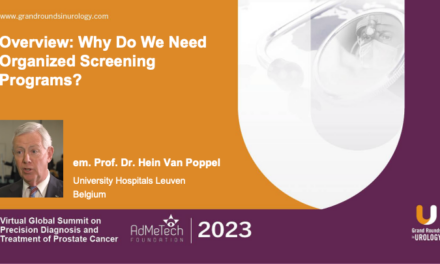Laurence Klotz, MD, FRCSC, presented “Treatment for Prostate Cancer with MRI-Guided Transurethral Ultrasound” during the 31st International Prostate Cancer Update in July 2021 in Snowbird, Utah.
How to cite: Klotz, Laurence. “Treatment for Prostate Cancer with MRI-Guided Transurethral Ultrasound.” July 2021. Accessed Jan 2026. https://grandroundsinurology.com/treatment-for-prostate-cancer-with-mri-guided-transurethral-ultrasound/
Treatment for Prostate Cancer with MRI-Guided Transurethral Ultrasound – Summary#
Laurence Klotz, MD, Professor of Surgery at the University of Toronto and the Sunnybrook Chair of Prostate Cancer Research, discusses MRI-guided transurethral ultrasound ablation (TULSA) in patients with localized prostate cancer. He characterizes this energy-based therapy as one that meets a need for patients with intermediate-risk prostate cancer, offering a less-invasive therapy with fewer quality-of-life effects than radiation and radical prostatectomy. Dr. Klotz explains the closed-loop controlled system and lays out the TULSA-PRO system components, emphasizing the power of the real-time thermal map when using thermal energy to heat tissue to destroy it. He then outlines the MRI-guided treatment workflow before listing the key features of TULSA: since it is a transurethral directional ultrasound ablation, it is incision- and radiation-free, with no energy being delivered through the rectum (thus avoiding rectal injury) and no volume limitation; the automated, closed-loop system eliminates guesswork and allows for precision, measuring temperature in real time, adjusting the amount of energy delivered to the tissue, and actively compensating for tissue and blood flow changes during the treatment; the therapy also offers thermal protection of important anatomy, including the urethra and rectum. Dr. Klotz then reviews previous TULSA technical and canine studies and the first-in-man treat and resect study for feasibility. This research led to a phase one safety and precision study that showed a 90 percent prostate-specific antigen (PSA) reduction. Dr. Klotz then reviews the TULSA-PRO Ablation Clinical Trial (TACT), which demonstrated a median PSA reduction of 95 percent, with consistent rates of biopsy-based improvement in 75-80% of men one year after TULSA therapy; data also show that TULSA therapy is easily tolerated and that most patients recover continence and erectile function within the year after therapy. Indeed, three-year follow-up data for TACT demonstrate that PSA response has been durable over time. Dr. Klotz concludes with a summary of TULSA, emphasizing the newness of this complex technology that is safe, precise, and has low toxicity. He highlights that it has been approved by the FDA and Health Canada and is emerging as a novel alternative to conventional therapy.
About The 31st Annual International Prostate Cancer Update:#
The International Prostate Cancer Update (IPCU), founded in 1990, is a multi-day CME conference focused on prostate cancer treatment updates with expert, international faculty. It is led by expert physicians and is designed for urologists, medical oncologists, radiation oncologists, and other healthcare professionals involved in the diagnosis and treatment of prostate cancer. Dr. Klotz delivered this educational activity during the 31st iteration of the meeting in July 2021 in Snowbird, Utah.
ABOUT THE AUTHOR
Laurence Klotz, MD, FRCSC, is a Professor of Surgery at the University of Toronto and the Sunnybrook Chair of Prostate Cancer Research at Sunnybrook Health Sciences Centre in Ontario, Canada. Dr. Klotz was the founding editor-in-chief of both theCanadian Journal of Urologyand theCanadian Urology Association Journal(CUAJ),and he is now editor emeritus of the CUAJ. Dr. Kotz’s research interests include active surveillance, micronutrients, and prostate cancer prevention.




